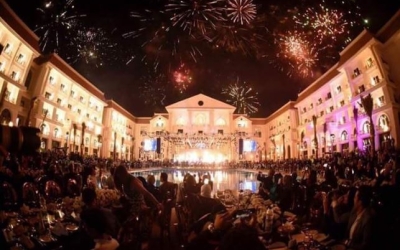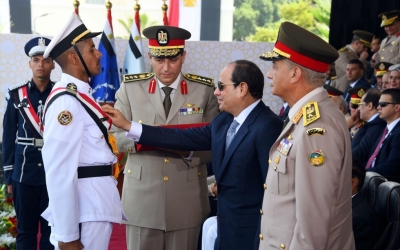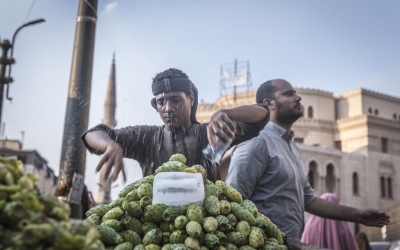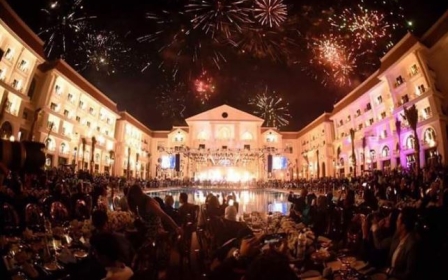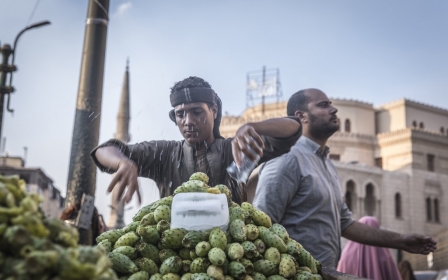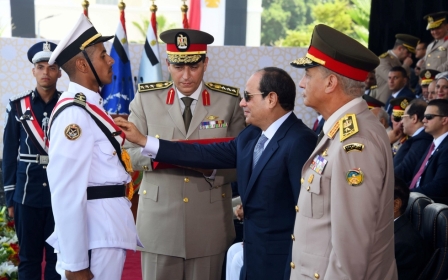Egypt's Sisi makes first public remarks on viral videos accusing him of corruption
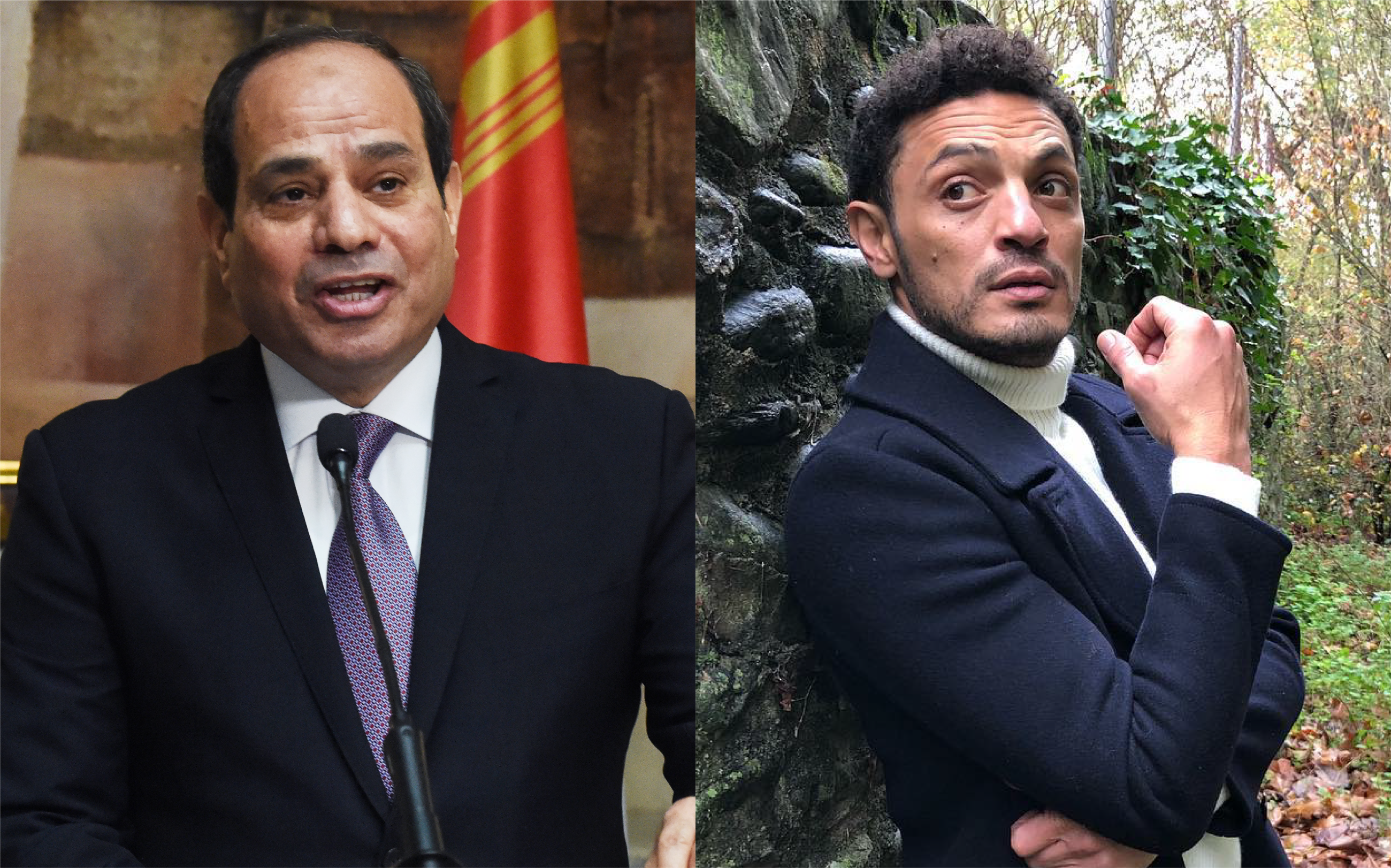
Egypt’s president Abdel Fattah el-Sisi responded on Saturday for the first time to a series of videos by an Egyptian whistleblower who accused him of misappropriating millions of dollars of public funds on personal projects.
The video testimonies by Egyptian film star and property tycoon Mohamed Ali have gone viral over the past two weeks as he accused several top government and military officials, including Sisi, of being involved in projects that were at best rushed, and at worst corrupt.
Ali’s videos, which he has been posting on a nearly daily basis since 2 September, have sparked a public debate on the contradiction between Sisi’s statements urging Egyptians to cut their spending and the president's alleged personal spending on palatial residences from the army’s budget.
'Yes we are hiding [information] because we don't want people to say that we are bragging about our achievements'
- Egypt President Abdel Fattah el-Sisi
Attending the eighth National Youth Conference in New Cairo on Saturday, Sisi used a conference session on combating the spread of fake news via social media to say he would like to address Ali’s questions despite advice by his intelligence agencies to ignore the videos.
The president confirmed during his speech that a number of new palaces, which he did not name, were being built using public money, but that the projects do not belong to him but rather to the Egyptian people.
New MEE newsletter: Jerusalem Dispatch
Sign up to get the latest insights and analysis on Israel-Palestine, alongside Turkey Unpacked and other MEE newsletters
“For two weeks, we haven’t been busy with anything except this topic [the videos], are you not concerned that junior officers are told that their senior leaders are bad guys?” Sisi told the packed conference room of about 1,600 people.
The president accused Ali of attempting to “shake the people’s trust” in their leaders, and urged the Egyptian people not to believe everything being said about the country’s leadership.
“It is your right to know. To all elderly mothers who believe me and pray for me, I would like to tell them: your son is honourable, sincere and honest,” he said.
“Yes, I have built presidential palaces, and will continue to do so. I am creating a new state; nothing is registered with my name, it is built for Egypt.”
Army contracts
In a series of videos posted from Spain, with an average length of 20 to 30 minutes, Ali said he was the owner of Amlaak, a major property company, and one of 10 companies that the military has contracted over the past 15 years to implement major construction projects.
Ali, who has moved permanently to Barcelona with his children, says he had to flee Egypt fearing for his family’s safety after deciding to speak publicly about the projects assigned to his company by the army.
Most of projects, he claims, have started without feasibility studies.
Middle East Eye has contacted the Egyptian government and Ali’s company for comment but did not receive a response by the time of publication, and Ali did not respond to a request for an interview.
In his videos, Ali has contrasted Sisi's alleged expenditure to the president's statements on Egyptian poverty.
"Now you say we are very poor, we must be hungry. Do you get hungry? You spend billions that are spilt on the ground. Your men squander millions. I am not telling a secret. You are a bunch of thieves," he says.
"However, there are many good men in the army who do not approve of what you are doing."
Egyptian authorities said in July that the country’s poverty rate had reached 32.5 percent, up from 25.2 percent in 2011.
'Yes we are hiding [information]'
Ali's videos, which he now posts on his new YouTube channel, have been widely shared and discussed by Egyptian opposition activists who have echoed his demands for Sisi to respond to Ali's questions, using the trending hashtag "Mohamed Ali has exposed them".
Social media users, including the activist group al-Mawkef al-Masry, have attempted to back up Ali’s claims by posting satellite images of projects he mentions in his videos, while his company’s website lists several projects he carried out with the army.
MEE could not independently verify the company's list.
Sisi said in 2016 that the military's share of the country's economy was no more than two percent.
Without transparency or oversight, it is hard to verify this and many observers believe the share is much higher.
An army spokesman said last week that the armed forces employ five million civilians in about 2,300 projects overseen by the military.
In response to Ali's questions to Sisi regarding the opaque nature of the army's budget, Sisi said on Saturday that the army's budget is deliberately hidden from oversight.
"Yes we are hiding [information] because we don't want people to say that we are bragging about our achievements," he said, adding that the army has overseen the construction of roads in recent years worth 157 billion Egyptian pounds ($9.6bn) and other mega projects that cost more than $245bn.
'Lavish lifestyle'
While a level of corruption and misappropriation of public funds has always been known to exist in Egyptian institutions, Ali's videos have raised eyebrows due to their focus on how this has been happening with both military and government oversight, and how Sisi has allegedly been personally involved in that.
"This misappropriation of public funds is to support the lavish lifestyle and living conditions of President Sisi and his wife," Dalia Fahmy, Associate Professor of Political Science at Long Island University, New York, told MEE earlier this week.
"This comes at a time of austerity programmes in Egypt, the rising cost of basic goods, and at a time where President Sisi has asked the average Egyptian to sacrifice even more for the future of the country, even stating that not everyone needs to be educated."
"For the average Egyptian to see state funds misappropriated to bankroll the building of luxury homes for the president and his family during times of austerity, that seems to cut deeper than the revelation of government corruption."
Rising prices
The country's economy has struggled since the 2011 uprising that toppled longtime leader Hosni Mubarak.
In an attempt to tackle a critical budget deficit, Sisi's government has implemented an austerity plan backed by the International Monetary Fund (IMF).
The government says the measures have helped stabilise government finances, while the IMF argues that new fiscal policies and a flexible exchange rate have contributed to economic stabilisation and have made Egypt more resilient to external shocks.
But Egyptians, particularly the middle class, have struggled to cope with the rising prices linked to the devaluation of the Egyptian pound in 2016 and the IMF-backed austerity measures, which included raising the prices of cooking gas and oil, electricity and basic food stuffs such as bread, milk, and lentils.
Sisi on Saturday largely blamed the country's economic woes on the 2011 pro-democracy revolution, saying it was "a conspiracy against the ministries of interior and defence".
"What happened in 2011 was extremely dangerous, but it would be more dangerous if you try to repeat it," he warned.
Middle East Eye delivers independent and unrivalled coverage and analysis of the Middle East, North Africa and beyond. To learn more about republishing this content and the associated fees, please fill out this form. More about MEE can be found here.


